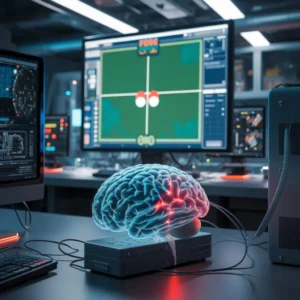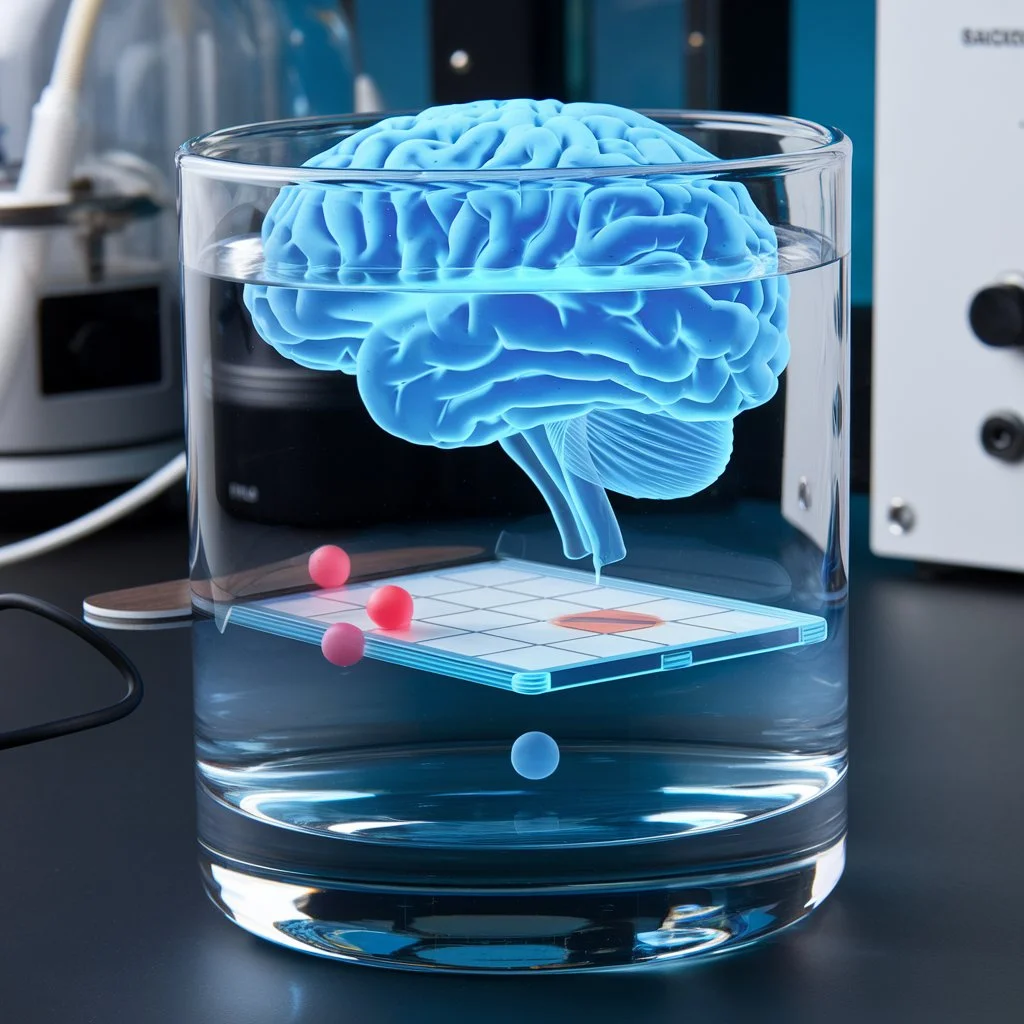Envision a future in which artificial intelligence not only mimics human cognition but also picks up knowledge and develops through natural interactions—where biology and technology coexist harmoniously to produce a previously unheard-of level of innovation. Greetings from the cutting-edge world of hydrogel brain technology! This revolutionary development is going to push the limits of artificial intelligence and change the way we think about intelligence. Come learn about the exciting intersection of neuroscience and artificial intelligence, and get ready to be enthralled with the ways hydrogels are revolutionizing machine learning, improving cognitive abilities, and creating opportunities that were previously only seen in science fiction. Come along as we examine the significant ramifications of this extraordinary union and see how it’s already influencing the future!
Introduction:
Our world is changing at a rate never seen before thanks to artificial intelligence (AI). The impact of artificial intelligence (AI) is evident in everything from smartphone personal assistants to complex algorithms that forecast market movements. But as technology develops, so does the need for increasingly intelligent systems—those capable of learning and adapting in ways that are still beyond our wildest dreams.
Now for Hydrogel Brain Technology. This ground-breaking method is raising the bar for deep learning capabilities and expanding the realm of what artificial intelligence can accomplish. One of its shining examples is Pong Genius, whose incredible innovations have caught the IT world by storm. As we explore this intriguing nexus of artificial intelligence and biology, you’ll see how Hydrogel Brain Technology not only lives up to but also significantly exceeds expectations.
Hydrogel Brain Technology: What Is It?
One cutting edge of artificial intelligence is Hydrogel Brain Technology. This innovative method uses a special gel-like substance that can change and respond to different stimuli to replicate human brain networks.
The hydrogel serves as a scaffold to enable intricate communication between artificial neurons. Comparing these interactions to typical AI systems allows for faster processing and better memory retention.
This technology is unique in that it can continuously learn from experiences. It provides a dynamic learning environment by evolving with fresh data inputs in addition to storing information.
Hydrogel materials’ flexibility and biocompatibility are being used by researchers to their advantage in a variety of applications. What was the outcome? a machine learning approach that is more natural and closely parallels biological processes than in the past.
The Pioneering Discovery
Pong Genius has become a sensation in the tech industry. This ground-breaking experiment demonstrates the artificial intelligence potential of hydrogel brain technology.
Pong Genius fundamentally combines digital learning techniques with biological concepts. AI systems can now process information like never before because to integration. Its organization is similar to human brain networks, and it closely resembles the way our minds work.
It has accomplished some amazing things. Pong Genius can quickly learn from experiences and take on challenging things. This makes it a priceless tool for developers looking for more intelligent solutions.
The accomplishment of the experiment shows how far biology and technology have come together. As we delve deeper into these developments, the possibilities appear endless, spanning from sophisticated decision-making in a variety of businesses to gaming.
How Does the Development of AI Affect Hydrogel Brain Technology?
The development of AI is significantly advanced by Hydrogel Brain Technology. It improves memory retention, which makes it possible for algorithms to store enormous volumes of data very effectively.
Processing speed is still another area that needs work. AI systems can access and interpret data far more quickly than they can with standard methods thanks to the special structure of hydrogel. The capacity to do this facilitates faster decision-making.
Furthermore, AI systems can develop in tandem with new data patterns thanks to the versatility provided by hydrogel technology. They get more and better at identifying abnormalities and modifying their models accordingly.
These developments not only improve performance but also provide new avenues for creative applications in a range of industries.
Enhanced Processing Speed and Memory
AI is being revolutionized by hydrogel brain technology, which improves processing speed and memory. With the help of this cutting-edge technique, which simulates the neuronal connections found in the human brain, machines can digest enormous volumes of data quickly.
Imagine an artificial intelligence (AI) with human-like recall abilities. Memories can be stored more effectively and retrieved nearly instantly in hydrogel-based devices.
This capacity changes how artificial intelligence learns from experiences while also speeding up computations. What was the outcome? smarter algorithms that swiftly adjust to changing circumstances.
As these systems advance, they offer previously unheard-of performance in a range of applications, from sophisticated scientific research problem-solving to real-time language translation. Artificial intelligence development is about to enter a new age thanks to hydrogel technology, which has enhanced memory retention and fast processing capabilities.
• Enhanced Abilities for Learning
Improved learning capacities are a revolutionary development in artificial intelligence, especially when combined with hydrogel brain technology. AI systems can now process and assimilate information more effectively than ever thanks to this creative method.
These devices can simulate cognitive processes in humans thanks to the special qualities of hydrogel. Similar to how we learn from events, so do them. This leads to enhanced decision-making skills across multiple domains and quicker adaption to new data sets.
Dynamic learning improves problem-solving abilities as well. AIs that are outfitted with this technology have the ability to generate answers not just from pre-programmed algorithms but also from real-time analysis and historical encounters.
Applications that were previously unthinkable become possible thanks to this breakthrough in learning capability. With AI’s ability to learn continuously while maintaining its grasp of prior knowledge, the possibilities are endless, ranging from customized educational tools to cutting-edge gaming settings.
Enhanced Flexibility with Regard to Novel Data
The use of hydrogel brain technology in AI systems offers a novel approach to adaptation. In contrast to conventional models that frequently falter when faced with unfamiliar data, this novel technique enables machines to adapt on the fly.
Hydrogel-based architectures have the ability to reorganize their brain pathways in response to new information. This procedure imitates the learning and adaptability of the human brain over time. Such adaptability enables AI systems to react skillfully even in the face of unforeseen difficulties.
An AI with such powers, for example, could examine data collections fast to spot anomalies or new trends. It is not merely memorization; it changes with the times.
This increased flexibility improves decision-making in a variety of fields, such as financial forecasting and healthcare diagnostics, guaranteeing that artificial intelligence is still useful and applicable in a world that is changing quickly.
Applications of Hydrogel Brain Technology in Real-World AI
The application of hydrogel brain technology is opening up new avenues in several fields, most notably medicine. Imagine AI systems with previously unheard-of accuracy in diagnosing illnesses. This invention provides individualized therapy regimens, greatly improving patient results.
The ramifications are similarly revolutionary in the field of finance. AI powered by hydrogel is capable of quickly analyzing large datasets to identify fraudulent activity before it gets out of hand. Predictive analysis improves in accuracy and dependability.
This technique is also very beneficial to autonomous vehicles. Improved ability to make decisions means safer navigating around challenging situations. These cars are able to immediately adjust to changing road conditions because to real-time data processing.
The adaptability of hydrogel brain technology indicates its promise in a variety of industries, offering more intelligent solutions and increased productivity anywhere it appears.
Medical: Identification and Scheduling of Treatments
Healthcare is being revolutionized by hydrogel brain technology, especially in the areas of diagnosis and treatment planning. Because of the speedy processing of large amounts of data, medical experts can now obtain previously unachievable insights.
Consider AI programs that concurrently examine clinical research data, genetic data, and patient records. More precise diagnoses that are customized for each patient are made possible by this capacity.
Furthermore, this technology’s adaptability allows it to virtually instantaneously refresh its knowledge base with new study discoveries. Real-time information on protocols and treatments are beneficial to healthcare providers.
Consequently, rather than being the exception, customized treatment programs become the standard. Patients receive care that is tailored to their particular needs. The implications are broad and include sectors such as cardiology and oncology.
This creative strategy optimizes workflows in healthcare facilities while simultaneously improving patient outcomes. As stress levels drop for both patients and healthcare professionals, efficiency increases.

Predictive analysis and fraud detection in finance
The application of hydrogel brain technology is causing a revolution in the finance industry. Thanks to this breakthrough, institutions can now perform complex predictive research and anticipate market patterns with greater accuracy than in the past.
Financial analysts are able to quickly identify trends in large datasets by using real-time data processing. Such effectiveness enables before unthinkable informed decision-making by banks and financial organizations.
Significant advancements have also been made in fraud detection. Hydrogel brains are incredibly quick at analyzing transaction trends and spotting irregularities that could point to fraud.
This skill maintains institutional integrity in addition to safeguarding customers. The public’s confidence in digital transactions increases when there is greater awareness of fraud.
The potential uses for hydrogel technology are growing as financial systems change. The consequences hold significant weight for risk mitigation and operational efficiency inside a progressively intricate environment.
Autonomous Vehicles: Enhanced Safety and Decision-Making Mechanisms
The cutting edge of innovation, autonomous cars are revolutionizing the way we think about transportation. These vehicles are able to process large volumes of data in real time because they have hydrogel brain technology built into their systems.
This capacity improves decision-making when driving. They evaluate different scenarios, for example, more quickly than a human could. They can prevent accidents by making safer decisions based on instantaneous analysis of traffic patterns and impediments.
Moreover, this cutting-edge technology strengthens safety precautions. Hydrogel-equipped cars quickly adjust to new information, such as abrupt changes in the weather or the state of the road. This flexibility is essential for emergency responses in unanticipated circumstances.
The development of AI in tandem with material breakthroughs bodes well for autonomous driving in the future. The combination relies on sophisticated decision-making processes, which not only increases efficiency but also gives passengers confidence that they are flying safely.
Reactions to and Debates About Hydrogel Brain Technology
Though promising, hydrogel brain technology has generated a great deal of discussion. Critics point up moral issues with altering cognitive processes. There is a great deal of potential for abuse in terms of control or monitoring.
Privacy concerns are also relevant. What protections are in place if AI systems driven by hydrogel brains are able to access and interpret human cognitive processes? Many technological and ethics experts are concerned about this subject.
Furthermore, it is impossible to ignore the dangers connected to these developments. Deep learning applications may have unintended repercussions that cause poor decisions in crucial industries like banking or healthcare.
Lastly, there are frequent issues with this technology’s limits. Even while it has a lot of promise, it might not always work better than conventional techniques. A crucial issue as we negotiate this complicated terrain is continuing to strike a balance between innovation and caution.
Moral Issues
There are serious ethical questions raised by the development of hydrogel brain technology. Concerns concerning Pong Genius and other AI systems’ autonomy and capacity for decision-making arise as these systems grow more sophisticated.
Manipulation potential is one problem. Who decides where these systems will go if they are capable of learning and adapting on their own? The consequences for personal space are astounding. Improved data processing capabilities may put user data at danger.
The loss of jobs is another issue. Numerous industries might experience a drop in personnel as AI systems gain in intelligence and efficiency. This change creates a conundrum: how to balance the effects of technology advancement on society.
In addition, there’s the accountability issue. Who is at fault when an AI makes a mistake or harms someone as a result of decisions that were influenced by hydrogel technology? It will be essential to address these moral conundrums as we negotiate this quickly changing artificial intelligence environment.
Possible Dangers and Restrictions
Although promising, hydrogel brain technology is not without its problems. The possibility of violations of data privacy is one major worry. Data security becomes more important as these sophisticated systems integrate more personal information.
Dependency is another problem. Overuse of this technology could eventually result in a decline in cognitive abilities in people. Over-reliance on AI may hinder people’s capacity for innovation and problem-solving.
There’s also concern about uneven access to this innovation. The application of hydrogel innovations that exclusively benefit specific populations could widen the socioeconomic gaps that already exist.
And lastly, there are concerns about AI behavior’s unpredictable nature. When robots learn and develop beyond what is intended of them, unanticipated outcomes could occur, taking us into new area where control becomes difficult.
Conclusion
Hydrogel Brain Technology has enormous potential to advance artificial intelligence in the future. We may anticipate important discoveries that could completely reshape the possibilities of artificial intelligence as scientists work to improve and hone this ground-breaking methodology.
Future advancements in memory improvement, processing speed, and adaptability will probably result in even more advanced models, such as Pong Genius, that can solve challenging issues in a variety of domains. Hydrogel brain system integration may open the door to more intelligent healthcare solutions catered to the unique demands of each patient or finance systems capable of making previously unheard-of market trend predictions.
Furthermore, we may see driverless cars with sophisticated decision-making capabilities derived from hydrogel technology’ real-time data analysis. As our streets get busier, this progression would guarantee improved safety precautions.
But as we go deeper into this field, it’s important to talk about the hazards and ethical issues that come with these developments. The creation and application of such potent instruments in society need careful thought.
There’s no telling how far we still have to go as we stand at the nexus of neurology and artificial intelligence thanks to discoveries.

